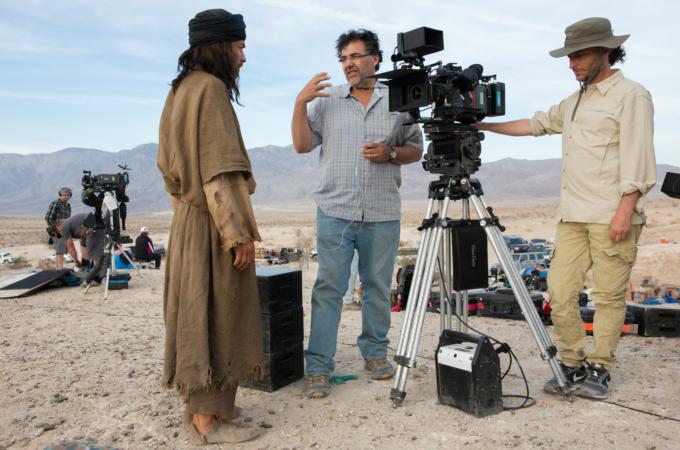Why 'Last Days in the Desert' is so boring
With his latest film, Last Days in the Desert, Rodrigo Garcia has accomplished something truly remarkable. He has taken a portion of the life of the single most compelling person who has ever lived and turned it into a colossally boring movie. As I watched Last Days in the Desert, I was reminded of many films that I saw in Paris as a doctoral student: lots of uninterrupted shots of natural scenes, many views of people walking around and saying nothing, endless close-ups of serious faces looking blankly into the middle distance. At times I thought that all of this meditative build-up would result in a spectacular payoff, but no--just more walking around and looking.
What made the film so tedious, however, was not simply its cinematic style. It was the fact that, like dozens of similar movies over the past fifty years, it portrayed Jesus simply as a human being, one spiritual searcher among many. I will confess to being amused by the breathless advertising around Last Days in the Desert, announcing that this movie is "reckless" and "daring" in its presentation of a more human Christ. Give me a break! What would be truly dramatic and eye-opening would be a film that compellingly shows that the carpenter from Nazareth is also God. In Ewan McGregor's characterization, we see Jesus as a good, decent, honest man who is earnestly seeking his path. There is nothing miraculous, distinctive, or particularly supernatural about him. He is like any other religious founder, indeed like any spiritually alert person you might run into at church. Fine, but so what? Why, one wonders, should we pay any attention to him? Why would this figure be remembered after 2,000 years? Why would much of Western civilization be grounded in him?
Now please don't misunderstand me: a clear affirmation of the humanity of Jesus is part and parcel of Christian orthodoxy. In the language of the council of Chalcedon, Christ is "truly human and truly divine," the two natures inhering in the unity of one person and coming together "without mixing, mingling, or confusion." According to the Church, Jesus is not quasi-divine and quasi-human, in the manner of Achilles or Hercules, but rather completely human and completely divine. There has been indeed, throughout Christian history, the temptation toward a monophysite reading, according to which Jesus has only one nature, namely divine. On this interpretation, the Lord's humanity is a simulacrum of a real human nature, as though God were merely donning the appearance of a human being. The orthodox Christian tradition has always stood athwart such a view. In fact, during the eighth century monothelite (one will) controversy, the Church held that Jesus has a fully-constituted human nature, endowed with a human mind and human will. Therefore, it is perfectly permissible to speak of real development within Jesus' human nature, as does the Gospel of Luke: "and Jesus advanced in wisdom and age and favor before God and man." It is even appropriate to speak, as the letter to the Hebrews does, of Jesus being "tempted in every way that we are." Thus Last Days in the Desert is certainly justified in portraying the Lord as subject to temptation and discouragement. So far, so orthodox.
But if Jesus is merely human, the heck with him. What makes him compelling, fascinating, and strange is the play between his humanity and his very real divinity. In point of fact, all of the poetry and drama of Christianity--on display in Chartres Cathedral, Dante's Divine Comedy, Aquinas's Summa, John Henry Newman's sermons, Chesterton's essays, the mysticism of Teresa of Avila, and the ministry of Mother Teresa--is a function of this juxtaposition. To reduce Jesus to the human level alone is to render an altogether prosaic Jesus, which is precisely what we have in Last Days in the Desert.
There is a distinction between the Bible and practically all other spiritualities, religions, and philosophies of the world. Whereas those last three can articulate very well the dynamics of our search for God, the former is not primarily interested in that story. It tells, rather, of God's search for us. Mind you, that first story is a darned good one, and it's told over and again in spiritual literature from the Epic of Gilgamesh to Star Wars. It has beguiled the minds of some of the great figures in human history: Homer, Virgil, Cicero, Plato, Spinoza, Kant, Newton, and James Joyce. In a very real sense, the comparative mythologist Joseph Campbell was right: in all of the cultures of the world, one great song is sung and one great monomyth is repeated. But the Bible is not one more iteration of the monomyth. It is the deeply disorienting account of how the creator of the universe hunts us down, finally coming after us personally in Jesus of Nazareth. Jesus is not one more man looking for God; he is God in the flesh, searching for his people: "It is not you who have chosen me; it is I who have chosen you."
Would that a filmmaker might come forward to tell that story.
- Bishop Robert Barron is the founder of the global ministry, Word on Fire, and is an Auxiliary Bishop in the Archdiocese of Los Angeles.



















